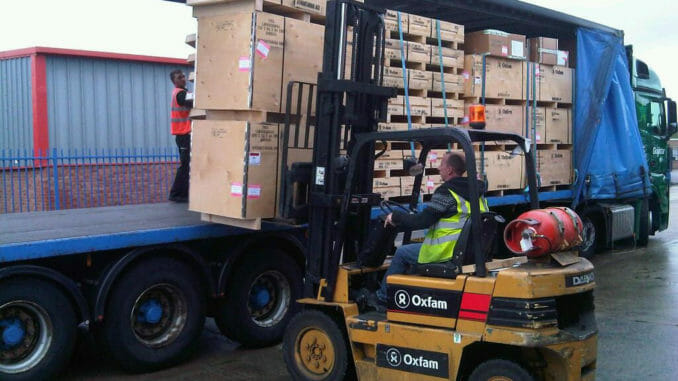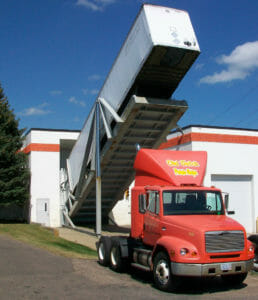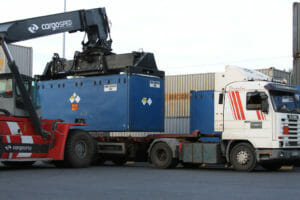
Now that you are a professional truck driver, there are more things to learn that just driving down the road. Your job neither starts nor ends on the road. Instead, your job starts at the shipper and ends at the receiver.
The shipper is where you pick up your load for delivery. The consignee, or the receiver, is your endpoint. For new truck drivers, shippers and consignees can help with logistical problems and get you loaded/unloaded quickly. Maintaining a good relationship with them keeps you on the road and earning money.
Here are 9 tips to foster a successful working relationship with your shippers and consignees.
1. Have Good Hygiene.
Even though truck drivers live in a casual world, that doesn’t mean you can to be a walking bum. Whether a male or female driver, good hygiene is a must. Shippers and consignees can see if you have grease or dirt on your shirt, and they can smell if you haven’t had a bath or a change of clothes in 3 days.
For over-the-road (long-haul) truck drivers, you may not be able to get a shower when you want it. Fortunately, there is a truck driver tip called an “instant bath” or “bird bath.” You started out life that way when your mom used baby wipes to clean you up after a diaper change. Well, those baby wipes still work.
Before you hit the road, make sure you have baby wipes. You can wipe yourself down, apply new deodorant, and put on clean clothes. Ever wonder why all the old-time truckers have short hair or the Marine cut? Short hair is easier to maintain, and it works well with baby wipes too. Clean drivers get more respect.
2. Be Friendly.

Remember the advice: “Do onto others as you have them do onto you.” It works. If you go into a company with a sour attitude, you can expect to get it back.
There is another saying that says, “Try walking a mile in the other person’s shoes before you judge.”
You don’t know what kind of day the shipper or consignee is having before you get there, so always be polite and considerate. Not only is it the right thing to do, but it’s the easiest way to get what you want.
If you’re friendly and undemanding, you can turn a 4-hour wait time into getting unloaded immediately.
Some drivers try to bribe dock workers or angrily force their demands. Shippers and consignees don’t like this, and they may make you wait even longer if you act like a jerk. They can even tell you to leave the company grounds and come back hours later.
How you handle people is up to you. And it makes all the difference.
3. Be Professional.
When you go into the dispatch office, introduce yourself and the company you represent. People like to talk to people with names. Leave your Bluetooth headset in the truck. It’s not professional to look as if you’re still talking on the phone.
Use professional language and proper grammar. Don’t cuss up a storm. Above all, if you say something, be truthful. If you promise something to the shipper or consignee, always do what you said you would.
4. Get Directions.
Most shippers and consignees will provide instructions how to get to their location, but trucks cannot drive on any road they want to. There may be weight restrictions or height restrictions. The last thing you want is an accident or a ticket for being in the wrong place.
With the use of a smartphone, a GPS, or a trucker’s atlas, you can easily verify if the directions given to you will work for trucks. Invest in your own success, and make sure you have these tools at your disposal.
If you’re not sure of the directions, either call your trucking company or call the shipper consignee. It’s important that you show up on-time and drive safely.
5. Be On Time.
You should never be late for a pickup or delivery. If you have an appointment time, be on time.
While your shipper or consignee does want you to be on time, they don’t want you to be there before they’re ready to load/unload your truck. They don’t want you and your trailer just waiting around. If you do show up early, try not to arrive more than an hour before your appointment time. If you want to go earlier than that, you should call and ask. Don’t just show up.
If you’re going to be late, then make sure you call and explain why you’re going to be late. Accidents or breakdowns happen on the road, and sometimes you get delayed. Be professional, polite, and call the company. You will be surprised how understanding they can be.
6. Mark the SLC.
Sometimes you will pick up a delivery where you didn’t watch the trailer get loaded. This is called a SLC, or a Shipper Load and Count. In this case, make sure to label SLC in the manifest.
These loads are usually sealed, making it difficult for you verify the count. By making sure to include the “SLC” marker, you prove to the consignee/receiver that the responsibility for the count of the load is with the shipper. You need to protect yourself with this notation on the manifest.
7. Wear the Right Footwear.
Truck drivers need to have proper footwear when they enter a place where they are loading or unloading. Can you imagine what would happen if your foot slipped off the brake pedal while wearing flip flops? The result could be catastrophic.
Driving, like any other job, needs the proper footwear. And this is just as true for loading/unloading as it is for the actual driving. You can wear your causal shoes when you’re off-duty, and you should wear good work shoes or boots when on the job.
8. Ask Your Company About Detention Time
One of the sad things about driving a truck is that you are sometimes forced to sit and wait at a shipper or consignee. This will happen on more than one occasion. Things go wrong; equipment breaks down; they don’t have the room for your deliver; or they haven’t finished making the product.

Depending on the trucking company you work for, some will pay you for the time that you are sitting at the dock. You should understand, however, that most companies have a two-hour minimum before they start paying this detention time.
Plants, such as for milk processing, and other tanker liquids have a three-hour minimum before detention pay kicks in. This is because of the cleaning process that’s needed after unloading the tanker.
Some companies will pay detention time automatically, while others, you must request the additional pay.
9. Rejected Load.
Sooner or later you will have a rejected load. Some consignees reject the delivery because the load has shifted or is damaged. If this happens, first call your dispatcher and ask what you need to do. Generally, they will have you dump it.
Sometimes, they give it to you, the driver, to discard on your own. Don’t assume this to be the norm, though. Taking something without permission can be considered stealing which could cost you your job and give you legal problems.
